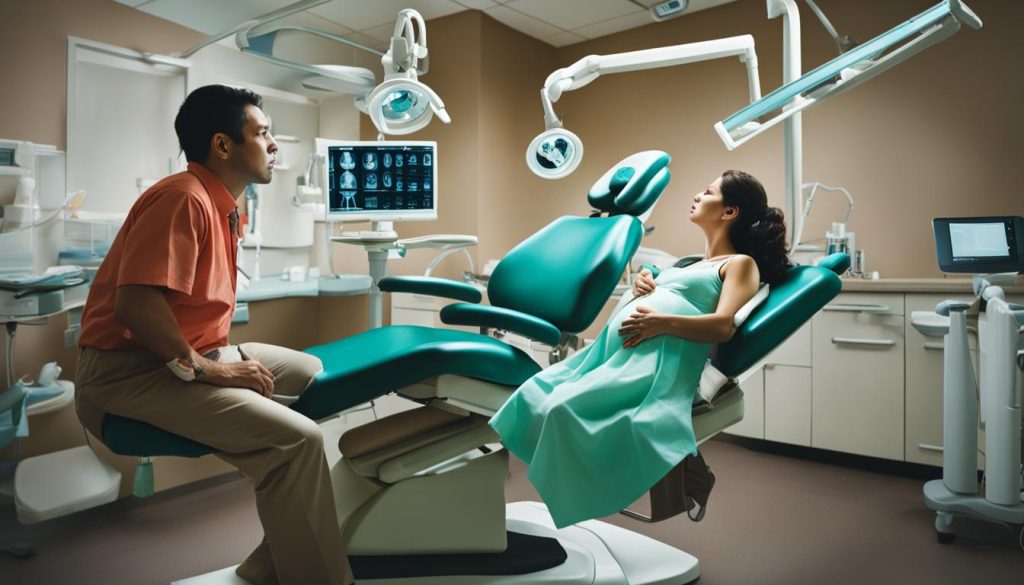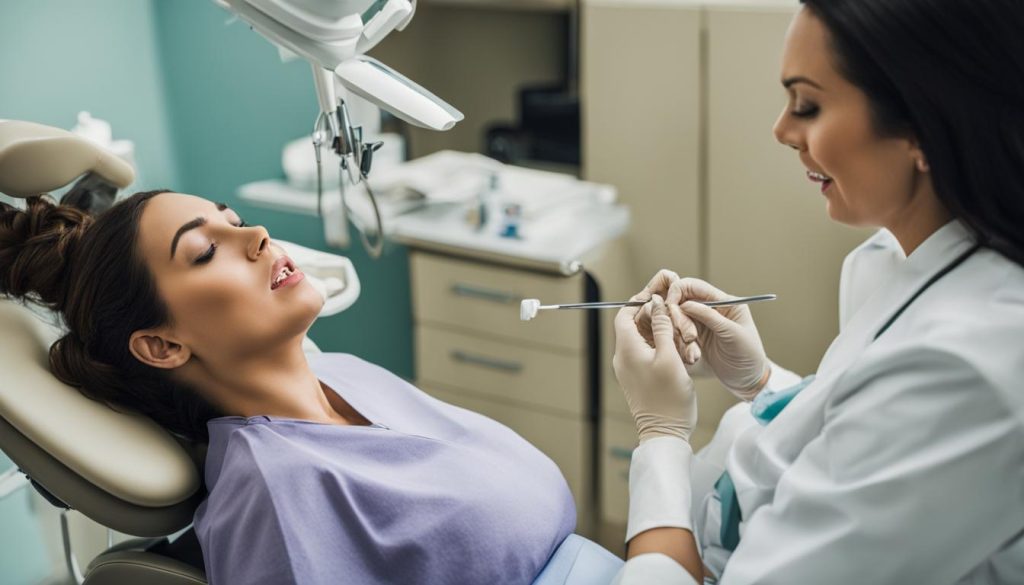Welcome to my blog where I will be discussing the topic of wisdom teeth removal during pregnancy. Many expectant mothers may have questions about whether it is safe to undergo this dental procedure while pregnant. In this article, I will provide you with important information about dental procedures during pregnancy, including the safety of wisdom teeth removal and the risks and considerations involved. So, let’s dive in and find out if you can indeed get your wisdom teeth removed while pregnant!
Before we delve into the details, it’s essential to note that the information provided here is not a substitute for professional medical advice. Always consult with your OB-GYN and dentist or oral surgeon to ensure the best care for your specific situation.
Risks and Considerations for Wisdom Teeth Removal During Pregnancy
When it comes to wisdom tooth removal during pregnancy, it’s important to understand the potential risks and considerations involved. While the procedure is generally considered safe, there are a few factors to keep in mind to ensure the well-being of both the mother and the baby.
One important consideration is the use of dental anesthesia during the removal process. Local anesthesia, which numbs the mouth, is typically safe for pregnant women. However, it’s important to consult with your dentist or oral surgeon to ensure they use the most suitable and safe anesthesia option for your specific situation. On the other hand, intravenous (IV) sedation is generally not recommended during pregnancy as it may pose potential risks.
X-rays are also commonly used to assess the positioning of the wisdom teeth and determine the best course of action. While modern dental x-rays minimize radiation exposure and are considered safe with the use of a protective apron, it’s still important to minimize unnecessary exposure during pregnancy. Your dentist or oral surgeon will take the necessary precautions to ensure the safety of both you and your baby.

Dental Emergencies during Pregnancy
In some cases, wisdom tooth removal during pregnancy may become necessary due to dental emergencies. If there is a risk of infection or permanent damage to the teeth or gums, immediate treatment may be required. It’s essential to communicate with your dentist or oral surgeon about any dental emergencies you may be experiencing so that they can assess the situation and provide the most suitable and safe treatment options.
Overall, wisdom tooth removal during pregnancy requires careful consideration and collaboration between your OB-GYN and dental professionals. By discussing your specific circumstances and concerns with them, you can ensure that the procedure is conducted with the utmost care and safety measures in place.
Dental Care and Oral Health During Pregnancy
Pregnancy is a transformative time for a woman’s body, and this includes changes in oral health. Hormonal fluctuations during pregnancy can make gums more susceptible to inflammation, bleeding, and infection. Therefore, maintaining good oral hygiene and seeking regular dental care are essential during this period. However, it is important to be aware of certain considerations to ensure optimal dental care while pregnant.
Regular dental cleanings and exams are generally safe during pregnancy and can contribute to overall oral health. However, routine dental x-rays should be postponed until after pregnancy, unless absolutely necessary. X-rays emit low levels of radiation, which can penetrate the uterus and potentially harm the developing fetus. To minimize risks, dental professionals will take extra precautions, such as using a lead apron to shield the abdomen.
The Importance of Dental Care During Pregnancy
Pregnant women may experience pregnancy gingivitis, a condition characterized by inflamed and bleeding gums. This is caused by hormonal changes that increase blood flow to the gums and make them more sensitive to plaque and bacteria. If left untreated, pregnancy gingivitis can progress to a more severe form of gum disease known as periodontitis, which can lead to tooth loss and other complications.
In addition to maintaining good oral hygiene practices, such as brushing and flossing regularly, pregnant women should prioritize regular dental check-ups to monitor their oral health. Dental professionals can provide guidance on proper oral care techniques and identify any issues that may require treatment. Seeking early intervention for potential dental problems can help prevent further complications and ensure a healthy pregnancy.
Precautions for Dental X-Rays During Pregnancy
Although routine dental x-rays are generally avoided during pregnancy, there may be situations where they are necessary for diagnosis or treatment planning. If dental x-rays are deemed necessary, dentists will take precautions to minimize radiation exposure. This includes using a lead apron to shield the abdomen and using the lowest possible dose of radiation needed to obtain the necessary images.
Ultimately, the goal is to balance the potential benefits of dental x-rays with the potential risks to the developing fetus. Dentists and radiologists are trained to follow strict guidelines and protocols to ensure the safety of pregnant women and their unborn babies during dental x-ray procedures.

It is important for pregnant women to prioritize their oral health and seek regular dental care during pregnancy. By maintaining good oral hygiene and working closely with dental professionals, they can minimize the risk of dental complications and ensure a healthy smile for both themselves and their babies.
Wisdom Teeth Removal and Pregnancy Trimesters
When it comes to wisdom teeth removal during pregnancy, the timing of the procedure may vary depending on the individual circumstances. Generally, it is recommended to postpone non-emergency procedures until after the first trimester, which is considered a crucial time for fetal development. However, in cases where there is a risk of infection, permanent damage, or severe pain, wisdom tooth extraction may be necessary regardless of the trimester.
The second trimester is often preferred for tooth extraction as the baby’s development is more advanced, and any required x-rays can be safely performed. During this trimester, the discomfort associated with reclining and prolonged dental procedures is usually more manageable. However, it is important to consult with your healthcare provider and dentist or oral surgeon to evaluate the risks and benefits specific to your situation.
While the third trimester is generally considered less ideal for wisdom tooth removal due to the discomfort and limited reclining options, emergency situations may still require tooth extraction. In such cases, the oral surgeon will take extra precautions to ensure the procedure is as safe and comfortable as possible for both the mother and the baby.
Safe and Comfortable Wisdom Teeth Removal During Pregnancy
When it comes to wisdom teeth removal during pregnancy, ensuring a safe and comfortable experience is of utmost importance. Finding a knowledgeable and experienced dentist or oral surgeon who understands the unique needs of pregnant patients is key. By following the appropriate precautions, dental emergencies during pregnancy can be effectively addressed.
Risks and Precautions
While wisdom tooth extraction is generally considered safe during pregnancy, it’s important to take certain precautions to minimize any potential risks. Utilizing a lead apron during x-rays helps protect both the mother and the developing baby from unnecessary radiation. Additionally, using local anesthesia for numbing the mouth during the procedure is safe for pregnant women.
However, IV sedation is not recommended during pregnancy due to potential risks. The oral surgeon will carefully assess the individual case and determine the best course of action. They may prescribe pain medication or antibiotics that are safe for both the mother and the baby, ensuring a comfortable and infection-free recovery.
Choosing the Right Practitioner
When undergoing wisdom teeth removal during pregnancy, it is crucial to find a practitioner who specializes in providing dental care for pregnant patients. They will have the necessary expertise to navigate the specific challenges and considerations that arise during this time. By selecting a dentist or oral surgeon who understands the unique needs of pregnant patients, you can feel confident in your treatment plan and overall well-being.
With the proper precautions and care, wisdom teeth removal can be performed safely and comfortably during pregnancy. Consulting with your OB-GYN and dentist or oral surgeon will ensure that you receive the best possible care, minimizing any potential risks and providing a positive dental experience.
Conclusion
In conclusion, it is possible to have your wisdom teeth removed while pregnant. According to the American Pregnancy Association, most dental procedures, including wisdom tooth extraction, can be performed safely during pregnancy. However, it is advisable to postpone unnecessary procedures until after the baby is born.
Consulting with your OB-GYN and dentist or oral surgeon is crucial to assess the individual risks and benefits. They will help determine if wisdom tooth extraction is necessary due to infection, permanent damage, or severe pain that affects your daily life. Together, you can formulate the best plan that ensures your safety and the well-being of your baby.
Throughout your pregnancy, maintaining good oral hygiene and attending regular dental check-ups are essential for your oral health. While routine dental cleanings and exams are generally safe, it is recommended to postpone routine dental x-rays until after pregnancy, unless absolutely necessary. Teeth whitening and non-emergency treatments should also be avoided during this time.
Remember, every pregnancy is unique, and the timing and approach to wisdom tooth removal may vary. It is crucial to find a knowledgeable and experienced dentist or oral surgeon who can provide safe and comfortable care. By following proper protocols, such as using lead aprons during x-rays and employing safe forms of anesthesia, you can ensure the best possible outcome for both you and your baby.
FAQ
Can you get your wisdom teeth removed while pregnant?
Yes, it is generally safe to have most dental procedures, including wisdom teeth extraction, during pregnancy. However, it is recommended to postpone unnecessary procedures until after the baby is born.
What are the risks and considerations for wisdom teeth removal during pregnancy?
X-rays are typically required before the procedure, but modern dental x-rays minimize radiation exposure and are considered safe. Local anesthesia is commonly used and is safe for pregnant women, but IV sedation is generally not recommended. Pregnancy can also make gums more vulnerable to inflammation and infection, so maintaining good oral hygiene is important.
How should I take care of my dental health during pregnancy?
It is important to maintain good oral hygiene and regular dental check-ups during pregnancy. Routine dental cleanings and exams are generally safe. However, routine dental x-rays should be postponed until after pregnancy, unless absolutely necessary. Non-emergency dental treatments, such as teeth whitening, are best avoided during pregnancy.
Is there a recommended timing for wisdom teeth removal during pregnancy?
The first trimester is considered a crucial time for fetal development, and non-emergency procedures may be postponed until after the first trimester. The second trimester is often preferred for tooth extraction as the baby’s development is more advanced, and any required x-rays can be safely done. The third trimester may be less ideal due to the discomfort associated with reclining and prolonged dental procedures. In emergency situations, tooth extraction may still be necessary regardless of the trimester.
How can I ensure a safe and comfortable wisdom tooth removal during pregnancy?
It is important to find a knowledgeable and experienced dentist or oral surgeon who can ensure a safe procedure. Precautions such as using a lead apron during x-rays, using safe forms of anesthesia, and prescribing medication that is safe for both the mother and the baby should be taken. The oral surgeon will assess the individual case and consider the risks and benefits to provide the best possible care.




